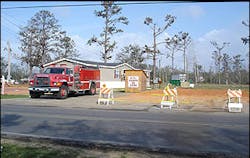Firefighters Struggle to Stay Afloat after Katrina
Katrina dealt a devastating blow to many fire stations. Some, along with the communities they served, were wiped off the face of the earth. Some are struggling to survive while they try to re-build, and others are facing new challenges as the populations shift.
Throughout the regions slammed by Katrina's aftermath, departments have seen their ranks dwindle. "People have to get their personal lives in order first. We still have many, many firefighters with no homes," said Ken Fontenot, who takes over next week as president of the Louisiana State Firemen's Association.
Some areas have seen a surge in population which is taxing the already strapped cadres who've seen increases in EMS calls and debris blazes.
Morale is low as frustrations mount. Volunteers are just overwhelmed with the challenges, and now are considering moves they once figured would be five or 10 years down the road.
Many departments in Louisiana and Mississippi have come to realize that they need help serving their communities. Paid personnel, once a foreign concept in rural areas, are now being hired to supplement the crews.
There is one paid part-time firefighter in each of the 10 stations in Harrison County, Miss., and fire officials are considering expanding that.
And in Louisiana, combination departments may just be the saving grace. "We're looking at it as a necessity now. The workload is just overwhelming. We can't keep up. We're flat worn out," said Roy Robichaux Jr., LASA president.
While crews struggle to bring their personal lives back to some type of normalcy, they also worry about keeping their fire equipment in good running order and replacing damaged stations. They also try to keep tabs on who's around to answer the call.
'There are a lot of challenges both physically and mentally," said Robichaux, a volunteer in Belle Chasse.
Firefighters there also worry about the nearly 10,000 folks living in travel trailers, and the issues they would face if one would catch fire. To date, six people have perished in FEMA trailers in the state.
The 45 volunteers in Belle Chasse operate out of three stations. They rely on and assist nearby communities with working fires. Water pressure remains low as only one-and-a-half water plants remain on line. Prior to Katrina, there were four.
It will be years until natural gas lines are repaired, and Robichaux said they worry about the use of propane in the trailers.
In the nearby parish, nine of the 12 stations were lost. Replacement and repairs are tied up in federal red tape. But, Robichaux said the fire service community across the country stepped up to help out. "They were tremendous, very generous. We have a building full of equipment, including apparatus, but no place to put it."
In Cameron Parish, La., the dozen volunteers are working on plans to re-build two stations. One was destroyed, and the other was so badly damaged that it had to be razed, said Chief Ron Johnson.
In the meantime, two engines are being housed in a recreation building. Four volunteers, including Johnson, leave work during the day to handle emergencies. Federal contract firefighters pulled out at the end of June.
Despite everything, the volunteers have continued to hold training drills. "We've had many fire departments looking out for us. They've given us money and some equipment. We lost some turnout gear, a four-wheeler and reserve hoses."
Calls for service in his community are down right now, and Johnson says that's because there are no stores, no library, no schools and no businesses. But, he said once the oilfields get back in full operation, that will change.
He said it will take years for things to return, and often wonders if nearby communities will ever survive.
In Harrison County, Miss., calls are up 92 percent since Katrina. And, things are expected to get a lot busier since the first casino re-opened Tuesday, said George Mixon, fire marshal.
"As I've said in the past, things here are moving at a snail's pace. But, we do finally see light at the end of the tunnel," Mixon said. "But, it's still an uphill battle everyday."
A metal building has been erected in DeLisle to replace the station where the roof collapsed onto the apparatus. It's the first to be funded by FEMA and state money.
Despite all the plans and reviews, there was still a snafu. Since the station was flooded with 22 inches of water after Katrina, engineers decided to raise it two feet.
"Now, they're building a ramp so we can get the fire engine in," Mixon said with a laugh. "Nothing is simple these days."
At night, they park the engine in a field near the home of a district chief and his son. In the morning, the part-time career firefighter drives it over to the station site, and it stays beside the trailer.
Over the past week or so, many in the community have, for the most part, turned off their TVs. "They're watching baseball games. But, everything else is storm-related. We lived it. We don't need to watch..."
Photos from New Orleans Fire Department's Chris Mickal
Photos From the Front Lines: The Days After Katrina in New Orleans
